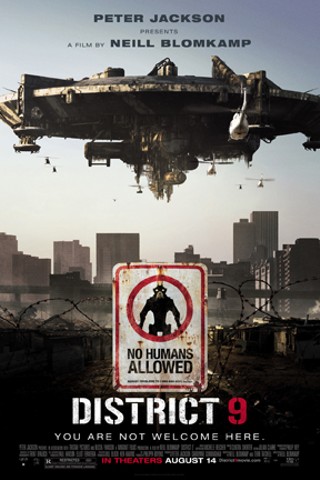While sitting on a death panel and trying to decide whether to abort your grandmother, I've been thinking a lot about lies and misrepresentation.
So has Neill Blomkamp, writer/director of District 9. In 2005, he made a short film, Alive in Joburg, about space aliens who come to Earth as refugees and are treated to South African apartheid, complete with shanty towns and "no aliens allowed" signs. In District 9, he's expanded the tale, added a well-executed if somewhat unnecessary action story, and, more importantly, done a nice job of showing how a change in perspective can result in an overwhelming wave of propaganda.
The film starts as a pseudo-documentary, with videotaped interviews with government officials and academic experts who've been studying the aliens since they arrived in 1990, 20 years earlier. The creatures, called "prawns" by their open-minded human neighbors, are about to be relocated away from the center of Johannesburg to a place where they'll no doubt be happier living in conditions that are somehow even more primitive than the shacks and refuse piles where they're currently ghettoized.
The documentary shows the prawns tearing at raw flesh, digging in piles of litter, fighting, scaring the populace and committing random acts of destruction. They're hideous, insect-like humanoids who speak in clicks and growls, and seem utterly unsympathetic. But then the film switches from documentary format to narrative, and, without contradicting itself, suddenly makes the aliens sympathetic and the humans grotesque and barbaric.
The documentary section, which continues intermittently throughout the film, follows middle-manager Wikus Van De Merwe (Sharlto Copley) as he's appointed to move the creatures away from the humans who find them unsightly and frightening. According to the bureaucrats and academic experts interviewed in the documentary, the aliens are aimless, shiftless worker-drones who lack the intelligence or ambition to do anything with their lives. It's a strangely familiar charge coming from the South African government.
But Wikus is a particularly weak-willed individual himself. In fact, it's Wikus who only acts when ordered to do so: The stereotype of the aliens really applies to him and the brutal mercenaries he works with. The real leaders, behind the scenes, include Wikus' father-in-law, an executive with a company that is trying to make use of the alien-weapon technology.
Unknowingly, Wikus becomes a pawn in this game when he's infected with alien biofuel and becomes the only human capable of firing the super-powered space guns. From there, the film loses a little of its political focus and becomes a chase-and-action movie as the company and its soldiers first experiment on, and then attempt to recapture, the slowly mutating Wikus.
The effects-laden shoot-'em-up is definitely well-rendered, and it is one of the best action films of the last few years, though the movie might have been better if Blomkamp had stuck with political parable. He does so for the first 20 minutes of the film, but when the documentary section breaks off, Blomkamp felt the need to fill some time with a narrative. It's a forgivable move, considering how tensely edited and well-shot the action is.
But Blomkamp doesn't just give up on his political allegory. Instead, he expands it, taking in not only questions of apartheid, but the manipulation of the media and the way we represent those we find burdensome. The alienness of the aliens is unsurpassed, and it helps explain the horrors that humanity is willing to inflict on those who look and act like something you'd want to squash underfoot if it ever skittered across your kitchen floor.
But when things shift to the prawns' point of view, the nature of the grotesque creatures, while remaining alien, is also humanized. One of the prawns, given the human name Christopher Johnson, becomes the point of identification, which is interesting, since no one plays or voices the character. Instead, he's a CGI construct whose vocalizations are machine-generated clicks and growls that are translated in subtitles. Yet he becomes the most, and perhaps the only, fully sympathetic character in a movie full of flawed figures. It's nice that Blomkamp didn't make his human protagonist a simple hero: Wikus is a lying coward, and as you start to root for him, he still manages to alienate the audience through his stupidity and selfishness. Even when Blomkamp redeems Wikus, he never simplifies him.
The fact that Blomkamp pulled off a successful, effects-laden action film for $30 million, or about 12 percent of what Harry Potter and the Bloody Prince Albert cost, is praiseworthy. But that he succeeds in simultaneously making a film that will stick with you for longer than it takes to digest your grease-covered popcorn is far more impressive.
He even avoids, until the final sequence, the use of mood-demanding music, trusting the audience to make up their own minds about how to feel about murder, torture and forced imprisonment. In his first feature, cinematographer Trent Opaloch shows all the technical chops of an accomplished Hollywood lensman, knowing both how to shoot a clear, easy-to-follow fight scene, and where to place the camera in tight quarters to produce tension while retaining information.
In some ways, District 9's success can be partially attributed to the technological revolution in filmmaking that's allowed almost anyone to make an effects movie. However, that same technological revolution has only given people the means to do so; the skill, as evinced by any 40-hour jag watching YouTube fan trailers, is still something that rarely shows up.
Blomkamp and Opaloch have it. Their no-name actors give disturbingly natural performances, and the film deals intelligently with political issues. In spite of all that, it's gripping entertainment. I can't wait for them to ruin it all in a sequel.











